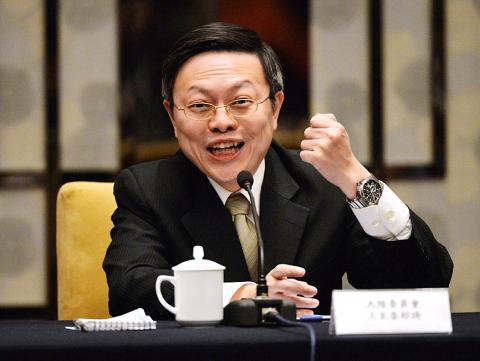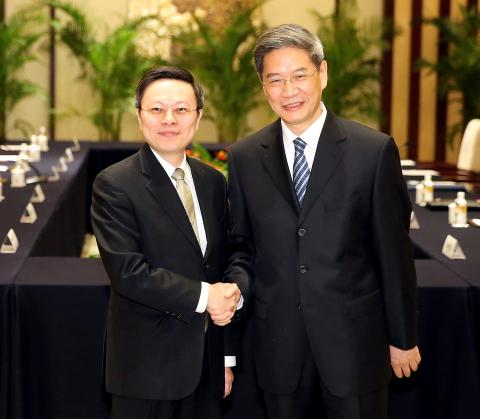Taiwanese and Chinese officials yesterday held the first direct and the highest-level talks since 1949, when the Chinese Nationalist Party (KMT) fled to Taiwan following its defeat by the Chinese Communist Party in the Chinese Civil War.
The historic meeting between Mainland Affairs Council (MAC) Minister Wang Yu-chi (王郁琦) and his counterpart, Taiwan Affairs Office (TAO) Minister Zhang Zhijun (張志軍), in the Chinese city of Nanjing, which agreed to establish a communication channel for future engagement, marked the first time in 65 years that government ministers from across the Taiwan Strait had held talks in their official capacities, despite more than a dozen agreements having been signed during President Ma Ying-jeou’s (馬英九) two terms in office.
Wang, who led a 20-member delegation on a four-day visit to China, told a press conference after a three-hour closed-door meeting at the Purple Palace Nanjing Hotel that his ministry and the TAO had agreed to establish a direct and regular communication platform and reached a consensus in principle on several issues.

Photo: AFP
The communication channel would go hand-in-hand with the current semi-governmental mechanism between the Straits Exchange Foundation (SEF) and the Association of Relations Across the Straits (ARATS), as they are complementary rather than adversarial, Wang said.
The issue of a potential meeting between Ma and Chinese President Xi Jinping (習近平) at an APEC summit in Beijing later this year, which has drawn suspicion from the opposition parties in Taiwan, was not raised at the meeting, nor was the sensitive topic of China’s demarcation of an East China Sea air defense identification zone, Wang said.
The minister said that he had “no regrets” about not discussing the potential Ma-Xi meeting because “it was not on the agenda in the first place.”

Photo: CNA
The Legislative Yuan had put Wang on a tight leash by passing a resolution prohibiting the minister from signing any written document during his visit.
The first highlight of the meeting came before the talks started as hundreds of reporters tried to anticipate how the officials would address each other, a barometer for a breakthrough in bilateral relations.
Wang referred to Zhang as “TAO Minister Zhang Zhijun,” while Zhang simply addressed Wang as “Minister Wang Yu-chi,” leaving out the name of Wang’s ministry, before the two shook hands and made their opening statements.
However, China’s state-owned Xinhua news agency referred to Wang as the “responsible official of Taiwan’s Mainland Affairs Council” in its Chinese-language reports and as “Taiwan’s mainland affairs chief” in its English-language coverage.
Both officials reiterated in their statements that the so-called “1992 consensus” serves as the foundation of bilateral engagement, which would be strengthened under the current framework in the future.
“It’s not been easy for us to be sitting at the same table today,” Wang said.
At the meeting, they agreed to seek a solution on health insurance coverage for Taiwanese students studying in China, pragmatically plan for the establishments of SEF and ARATS offices in each other’s territory and study the feasibility of allowing humanitarian visits to detained nationals once the offices have been established.
Taiwan raised the issue of reciprocal exchange of news information, but did not protest China’s refusal to issue visas to two Taiwanese reporters who wished to travel to cover the visit.
Wang also brought up Taiwan’s hope for parallel progress between economic integration with China and the rest of the world, without receiving a positive response from the Chinese side.
In his opening statement, Zhang said cross-strait relations “cannot afford to suffer from another decline” after they have dramatically improved since May 2008 — when Ma took office.
A Xinhua report said the meeting has reached “positive consensus” on many fronts, including an insistence on the “1992 consensus,” opposition to independence for Taiwan and strengthening exchanges.
The report urged follow-up agreements under the Economic Cooperation Framework Agreement (ECFA) and to study the feasibility of bilateral cooperation on regional economic integration.
Zhang also accepted Wang’s invitation for a return visit, it said.
Wang is scheduled to visit the Sun Yat-sen Mausoleum today, before delivering a speech at Nanjing University on youth exchanges across the Taiwan Strait.
He is due to attend a forum and hold talks with Chinese think tanks tomorrow, before wrapping up the trip and returning to Taipei on Friday.

SECURITY: As China is ‘reshaping’ Hong Kong’s population, Taiwan must raise the eligibility threshold for applications from Hong Kongers, Chiu Chui-cheng said When Hong Kong and Macau citizens apply for residency in Taiwan, it would be under a new category that includes a “national security observation period,” Mainland Affairs Council (MAC) Minister Chiu Chui-cheng (邱垂正) said yesterday. President William Lai (賴清德) on March 13 announced 17 strategies to counter China’s aggression toward Taiwan, including incorporating national security considerations into the review process for residency applications from Hong Kong and Macau citizens. The situation in Hong Kong is constantly changing, Chiu said to media yesterday on the sidelines of the Taipei Technology Run hosted by the Taipei Neihu Technology Park Development Association. With

CARROT AND STICK: While unrelenting in its military threats, China attracted nearly 40,000 Taiwanese to over 400 business events last year Nearly 40,000 Taiwanese last year joined industry events in China, such as conferences and trade fairs, supported by the Chinese government, a study showed yesterday, as Beijing ramps up a charm offensive toward Taipei alongside military pressure. China has long taken a carrot-and-stick approach to Taiwan, threatening it with the prospect of military action while reaching out to those it believes are amenable to Beijing’s point of view. Taiwanese security officials are wary of what they see as Beijing’s influence campaigns to sway public opinion after Taipei and Beijing gradually resumed travel links halted by the COVID-19 pandemic, but the scale of

A US Marine Corps regiment equipped with Naval Strike Missiles (NSM) is set to participate in the upcoming Balikatan 25 exercise in the Luzon Strait, marking the system’s first-ever deployment in the Philippines. US and Philippine officials have separately confirmed that the Navy Marine Expeditionary Ship Interdiction System (NMESIS) — the mobile launch platform for the Naval Strike Missile — would take part in the joint exercise. The missiles are being deployed to “a strategic first island chain chokepoint” in the waters between Taiwan proper and the Philippines, US-based Naval News reported. “The Luzon Strait and Bashi Channel represent a critical access

Pope Francis is be laid to rest on Saturday after lying in state for three days in St Peter’s Basilica, where the faithful are expected to flock to pay their respects to history’s first Latin American pontiff. The cardinals met yesterday in the Vatican’s synod hall to chart the next steps before a conclave begins to choose Francis’ successor, as condolences poured in from around the world. According to current norms, the conclave must begin between May 5 and 10. The cardinals set the funeral for Saturday at 10am in St Peter’s Square, to be celebrated by the dean of the College